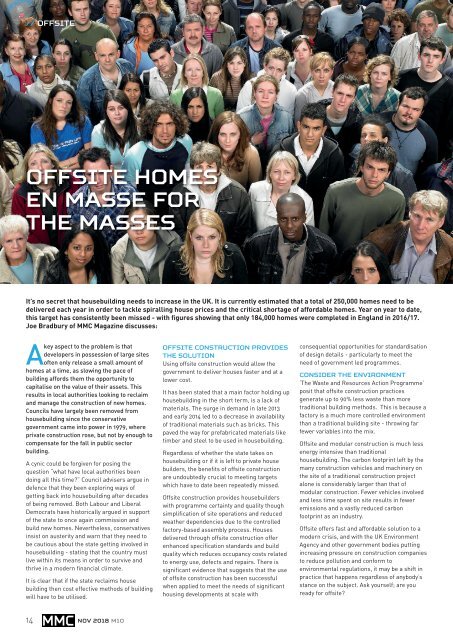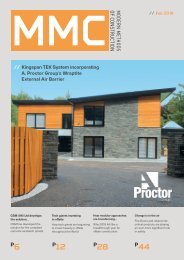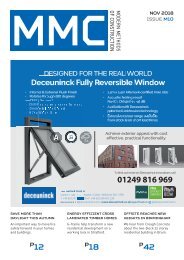You also want an ePaper? Increase the reach of your titles
YUMPU automatically turns print PDFs into web optimized ePapers that Google loves.
Offsite<br />
Offsite homes<br />
en masse for<br />
the masses<br />
It’s no secret that housebuilding needs to increase in the UK. It is currently estimated that a total of 250,000 homes need to be<br />
delivered each year in order to tackle spiralling house prices and the critical shortage of affordable homes. Year on year to date,<br />
this target has consistently been missed - with figures showing that only 184,000 homes were completed in England in 2016/17.<br />
Joe Bradbury of <strong>MMC</strong> Magazine discusses:<br />
Akey aspect to the problem is that<br />
developers in possession of large sites<br />
often only release a small amount of<br />
homes at a time, as slowing the pace of<br />
building affords them the opportunity to<br />
capitalise on the value of their assets. This<br />
results in local authorities looking to reclaim<br />
and manage the construction of new homes.<br />
Councils have largely been removed from<br />
housebuilding since the conservative<br />
government came into power in 1979, where<br />
private construction rose, but not by enough to<br />
compensate for the fall in public sector<br />
building.<br />
A cynic could be forgiven for posing the<br />
question “what have local authorities been<br />
doing all this time?” Council advisers argue in<br />
defence that they been exploring ways of<br />
getting back into housebuilding after decades<br />
of being removed. Both Labour and Liberal<br />
Democrats have historically argued in support<br />
of the state to once again commission and<br />
build new homes. Nevertheless, conservatives<br />
insist on austerity and warn that they need to<br />
be cautious about the state getting involved in<br />
housebuilding - stating that the country must<br />
live within its means in order to survive and<br />
thrive in a modern financial climate.<br />
It is clear that if the state reclaims house<br />
building then cost effective methods of building<br />
will have to be utilised.<br />
14 <strong>MMC</strong><br />
Nov 2018 <strong>M10</strong><br />
Offsite construction provides<br />
the solution<br />
Using offsite construction would allow the<br />
government to deliver houses faster and at a<br />
lower cost.<br />
It has been stated that a main factor holding up<br />
housebuilding in the short term, is a lack of<br />
materials. The surge in demand in late 2013<br />
and early 2014 led to a decrease in availability<br />
of traditional materials such as bricks. This<br />
paved the way for prefabricated materials like<br />
timber and steel to be used in housebuilding.<br />
Regardless of whether the state takes on<br />
housebuilding or if it is left to private house<br />
builders, the benefits of offsite construction<br />
are undoubtedly crucial to meeting targets<br />
which have to date been repeatedly missed.<br />
Offsite construction provides housebuilders<br />
with programme certainty and quality though<br />
simplification of site operations and reduced<br />
weather dependencies due to the controlled<br />
factory-based assembly process. Houses<br />
delivered through offsite construction offer<br />
enhanced specification standards and build<br />
quality which reduces occupancy costs related<br />
to energy use, defects and repairs. There is<br />
significant evidence that suggests that the use<br />
of offsite construction has been successful<br />
when applied to meet the needs of significant<br />
housing developments at scale with<br />
consequential opportunities for standardisation<br />
of design details - particularly to meet the<br />
need of government led programmes.<br />
Consider the environment<br />
‘The Waste and Resources Action Programme’<br />
posit that offsite construction practices<br />
generate up to 90% less waste than more<br />
traditional building methods. This is because a<br />
factory is a much more controlled environment<br />
than a traditional building site - throwing far<br />
fewer variables into the mix.<br />
Offsite and modular construction is much less<br />
energy intensive than traditional<br />
housebuilding. The carbon footprint left by the<br />
many construction vehicles and machinery on<br />
the site of a traditional construction project<br />
alone is considerably larger than that of<br />
modular construction. Fewer vehicles involved<br />
and less time spent on site results in fewer<br />
emissions and a vastly reduced carbon<br />
footprint as an industry.<br />
Offsite offers fast and affordable solution to a<br />
modern crisis, and with the UK Environment<br />
Agency and other government bodies putting<br />
increasing pressure on construction companies<br />
to reduce pollution and conform to<br />
environmental regulations, it may be a shift in<br />
practice that happens regardless of anybody’s<br />
stance on the subject. Ask yourself; are you<br />
ready for offsite?
















